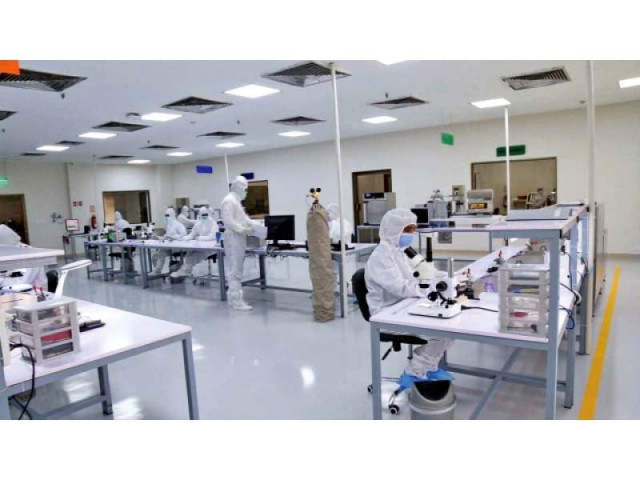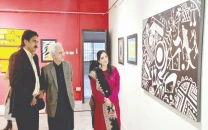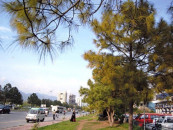NUST’s locally made stents – hope for poor
Products will be readily available at a quarter of cost of imported ones

After eleven years of individual and another three years of collective efforts, Dr Murtaza Najabat Ali and his team experienced a Eureka moment.
The highly motivated team of young scientists of the Biomedical Engineering Department at the National University of Sciences and Technology (NUST), Islamabad, had been constantly working to manufacture high-quality and cost-effective stents to facilitate 80 per cent of Pakistan’s population who suffer from cardiovascular diseases but are deprived of treatment due to exorbitant costs.
The locally manufactured stents and catheters will be readily available in local hospitals at one-fourth of the price of its competitive imported products at the end of this year. The price of imported bare metal and drug-eluting stents in the market ranges from Rs35,000 to Rs55,000, and Rs75,000 to Rs125,000, respectively.
Quality with cost-effectiveness was the major motivation which brought these products to the market, Dr Najabat Ali, Chief Executive Officer (CEO) N-ovative Health Technologies (NHT) at NUST and the man behind the milestone achievement, told The Express Tribune.
“In 2006, when I developed a stent at the cost of three British pounds while I was in the United Kingdom, the first thought that came to my mind was to introduce this cost-effective solution in Pakistan.”
Dr Ali added that more than 60 patients have been implanted with the stents /catheters and the team has even received video testimonials from recovered patients from Rawalpindi, Islamabad, and Karachi.
“All the patients and their families are satisfied with the quality of the products and thankful to our team’s efforts,” Dr Ali said.
NHT’s clinical team head Major General (Retd) Dr Azhar Kayani said that the local production of such medical equipment devices is the need of the hour, as it will benefit the country and its citizens in more than one way.
“The current statistics reveal that 40,000 stents are implanted each year, but the facility is available to economically-sound patients, which covers only 20 per cent of the market demand of stents in Pakistan.”
The foreign exchange import component for cardiovascular devices is Rs8.5 billion annually. The NHT production capacity is 15,000 units per annum which can cater to about 25 to 30 per cent of the diseased population in Pakistan.
A bumpy journey
The journey of locally manufactured stents witnessed many ups and downs in Pakistan due to the non-availability of infrastructure and financial resources.
“Whenever we felt discouraged, the motivation to do something for the needy people of this country was always there to encourage us and keep out morale high against all odds,” Dr Murtaza, another team member, said.
Deputy General Manager Stent Dr Mariam Mir said the execution in the public sector was the major challenge as the sector has its systems, timelines, and attitudes to carry out things. “Since it was a new development, the regulatory bodies had to equip themselves with it first, which took some time,” she added. “Other countries were also reluctant to transfer the technology to Pakistan due to various push and pull factors.”
Dr Ali said the local cardiologists' scepticism about the quality of locally made products was another daunting task, which took years to overcome.
“To address their doubts, we hired a clinical team comprising the country's renowned cardiologists in the supervision of Maj Gen (Retd) Dr Azhar Kayani, who is a renowned cardiologist, popular for establishing the state-of-the-art Rawalpindi Institute of Cardiology (RIC). The team supervised our tests and trials both in Pakistan and in Germany.”
Speaking on the development, Heinz Schade GmbH-Germany’s Director Jessica Schade said that at the time of partnering with the NHT, her company was sceptical about the quality of the products and the capability of the NHT to produce complex life-saving medical devices in a country like Pakistan,
“While conducting extensive testing in Germany, however, we found the stents and catheters to be of good quality,” she said.
A historical development
The journey of stents manufacturing in Pakistan started back in 2007 when Dr Najabat Ali wrote an email to the former president of Pakistan Pervaiz Musharraf, asking for the government’s support in establishing a facility to manufacture stents at a local level.
The email was forwarded to the Ministry of Science and Technology and other related research organisations such as the National Engineering and Scientific Commission (NESCOM).
“The then chairman of NESCOM Dr Samar Mubarakmand approached me and offered a facility on behalf of his organisation. In this way, the work on the project started,” Dr Ali recalled. “It was the first time in the history of Pakistan when a stent was manufactured at a local level. However, the project could not be transformed into a commercial venture due to legal restrictions.”
Tests and trials
The locally produced stents were tested extensively in comparison to its international counterparts and be at par with clinical performance of the imported stents. The tests were carried out in different renowned centres of Germany and Poland.
“We have conducted multi-centric human trials of NHT-produced cardiac stents in collaboration with professor Khusro Niazi of the Heart and Vascular Center, United States, in the supervision of our clinical team head Maj Gen (Retd) Dr Azhar Kayani,” said Dr Murtaza. “The university trial results were promising. Clinical trials for the products have also been carried out in collaboration with esteemed cardiologists located in Atlanta, RIC Rawalpindi, and the National Institute of Cardiovascular Diseases (NICVD), Karachi.”























COMMENTS
Comments are moderated and generally will be posted if they are on-topic and not abusive.
For more information, please see our Comments FAQ